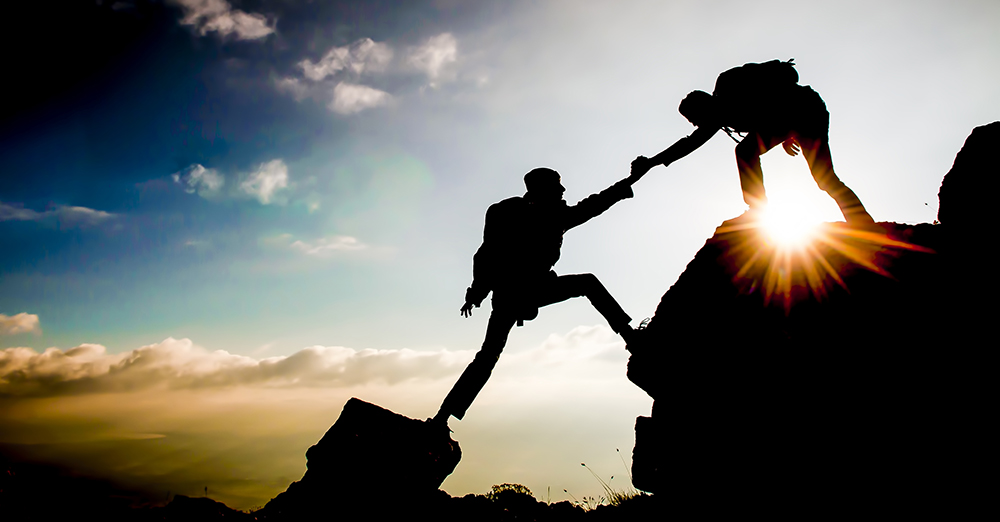Trust is one of those really important things we that helps us live fulfilling lives. Yet trust is sometimes one of the hardest things to nurture in ourselves. Everyone has felt the sting of betrayal because they trusted someone they shouldn’t have. It isn’t fun and can leave one to either question themselves, as well as trust less. Let’s talk about how and why trust is important – and then discuss the easy ways to restore the feeling of trust in your life.

Trust is imperative to build healthy relationships, with others and with yourself. Trust is elemental force that holds our world together. It is societal “glue” that cements our relationships by allowing people to live and work together. And most importantly, trust is internal – trusting yourself, trusting the world, trusting that things will work out for the best. This is the internal glue which allows us to develop confidence and internal strength.
With social interactions, trust typically appears at a subconscious level. The mind evaluates the potentiality of benevolent intentions through cues sent during the interaction. Body language, words, tonal quality of the voice, past history; all subconsciously calculated to determine whether a person should trust the other. One can rationalize whether someone is trust-worthy, but the act of trusting can be less a mindful choice and more intuitive/subconscious act.
If the process of trust is a subconscious act, how does someone who gives their trust too willingly (gullible) learn to better balance their risks?
We have the following sayings about dis-trust:
– Don’t trust anyone that says ‘Trust Me’.
– Never trust anyone that always speaks in absolutes, because nothing is guaranteed. (puns are intended)
— Never speak in absolutes.
At first, you might think people who use these sayings are jilted or jaded. But in actuality, these statements were created by people who understood the fundamental inter-relation between trust and our internal and external world.
What is trust?
The state of trust is an emotional state, initiated at a subconscious and intuitive level. It is the foundation of our confidence. It can be applied to:
- relationships within (trusting yourself),
- spiritual relationships (trusting in God, higher being, fate, etc),
- external relationships (trusting in your partner, friends, associates, team-mates, etc) and even applied to a process.
Trust is something people learn and earn. It takes time to build trust, starting with small actions and building to a much deeper level of trust. Since trusting is a subconscious decision, it is built over time through honoring commitments, being consistent, being honest, being open, sharing with others and appreciating the efforts of others.
We have all probably trusted “too soon”, misunderstanding the true nature of a friendship or even a business deal. Giving your trust to someone that has not yet earned it, can lead to less than beneficial situation.
If trust is broken, how to you restore it?
Broken trust, we have all experienced it. Betrayed from your best friend or lover. Someone said they would do something … and they didn’t. You believed in yourself and then failed. We have all been there. And when it happens over and over and over again… we can develop issues with trust.

When we lose our trust, the BEST way to recover … is to work with ourselves first. The easiest way to restore confidence is to do what we say we are going to do. Setting and meeting our personal goals is vital to trusting in yourself.
Another way to restore trust, it to trust in something that is a sure deal. So what is a sure deal in our life? The sun sets. The sun rises. Grass grows. Our pets require to be fed at the same time every day. Dogs want to go for a walk. Cats scream at you if not fed. Nature. Trust in nature. Nature doesn’t function with guilt. It just is the way it is. It functions with a rhythm that rarely fails. The ebb and flow of the ocean tides. The moon cycles. The sunrise/sunset. THAT you can trust will happen regardless of how your day went.
Restoring Trust

Most people want to restore trust in their relationships, external trust. And although there are several different websites and counseling sites that give great suggestions… my suggestion is to restore trust with yourself first. Do you believe in yourself? Do you know the signs of someone who is manipulating a situation? Do you trust too soon? Do people earn your trust, or do you give it away too willingly – with hope that this time will be different? Are you gullible?
To restore trust with yourself…. do what you know to be true. Watch the sunset every night. This is a moment of saying “goodbye, I will see you tomorrow.” Everyone feels this somber sense of closure. And when the sun rises in the morning, it subconsciously instills trust. The sun sets. The sun rises again. Every day, without fail.
Set reasonable goals. Then meet them. All too often the wishful soul sets goals that are lofty, thinking the larger the goals the larger the return. But if you continually miss your mark, it can deplete your confidence in yourself. Yes, it is a good thing to dream big. But every once in a while, set goals that you know you can easily complete. Having issues with trust is a great time to scale down the dreams, and hit your mark every time.
Understand that there are people out there that want you to trust them without spending the time to earn it. These people use methods and strategies to imply a trusting connection quickly. They say things like “trust me” or “honestly”. Their use of the language of trust in normal conversation sets the stage for a ‘quick to trust’ relationship. This places you in a vulnerable position and can lead to a potential betrayal. Be weary of anyone that pushes the relationship into a ‘quick to trust’ position.
Once you have a healthy one-on-one relationship with trust, you can more easily navigate interpersonal trust. When the right person comes around, you can trust yourself, which means you can trust you ability to understand your judgement that a situation or person is right person for you.

